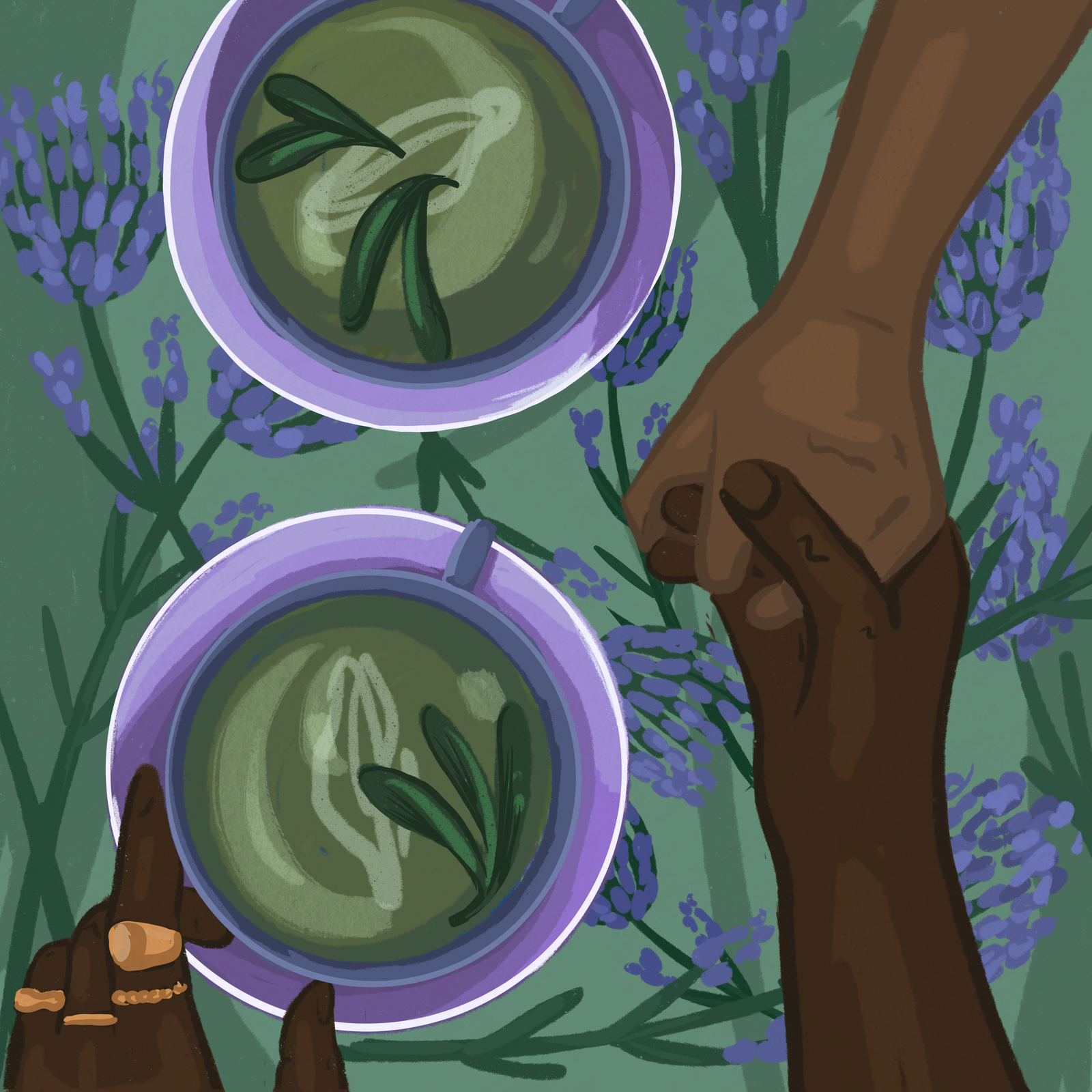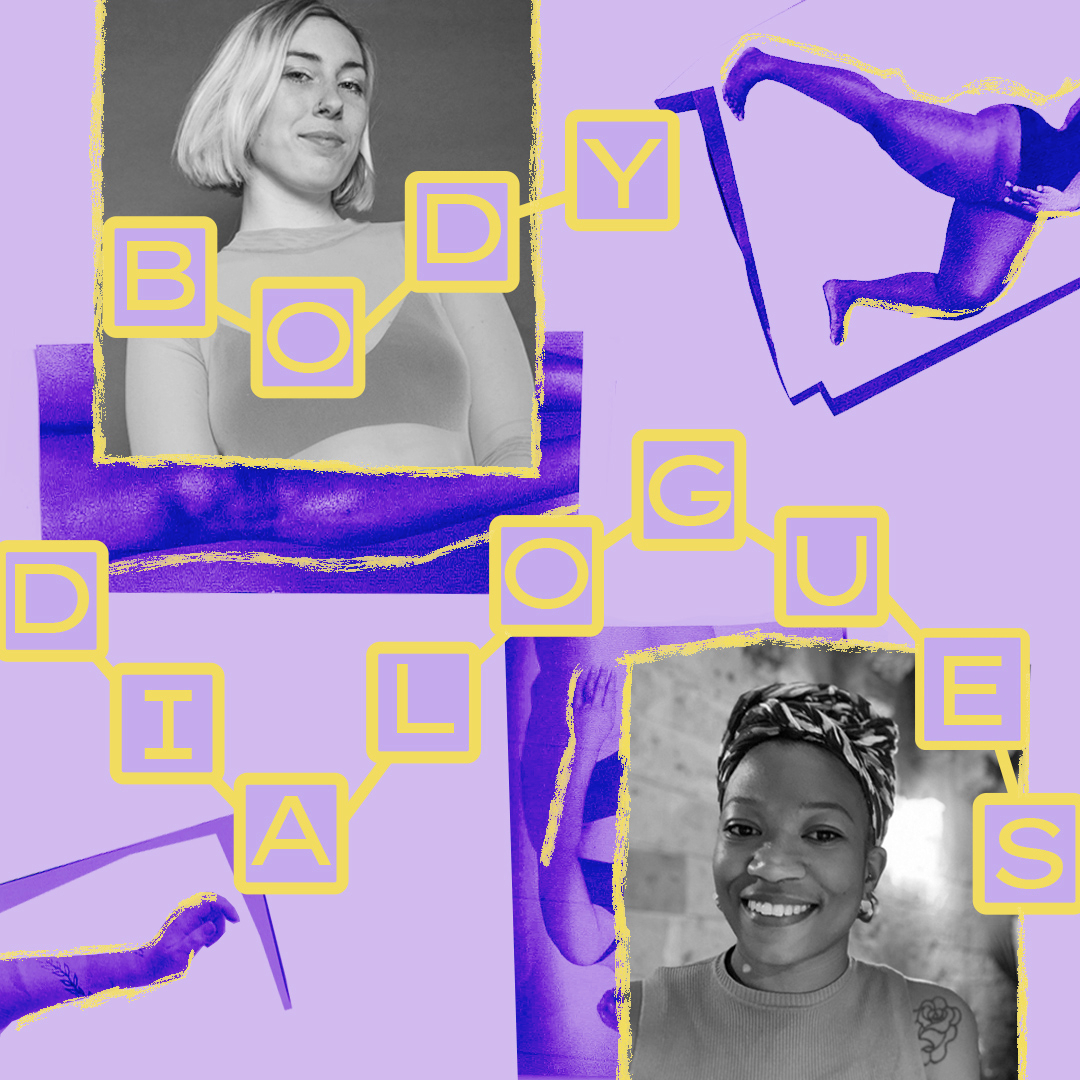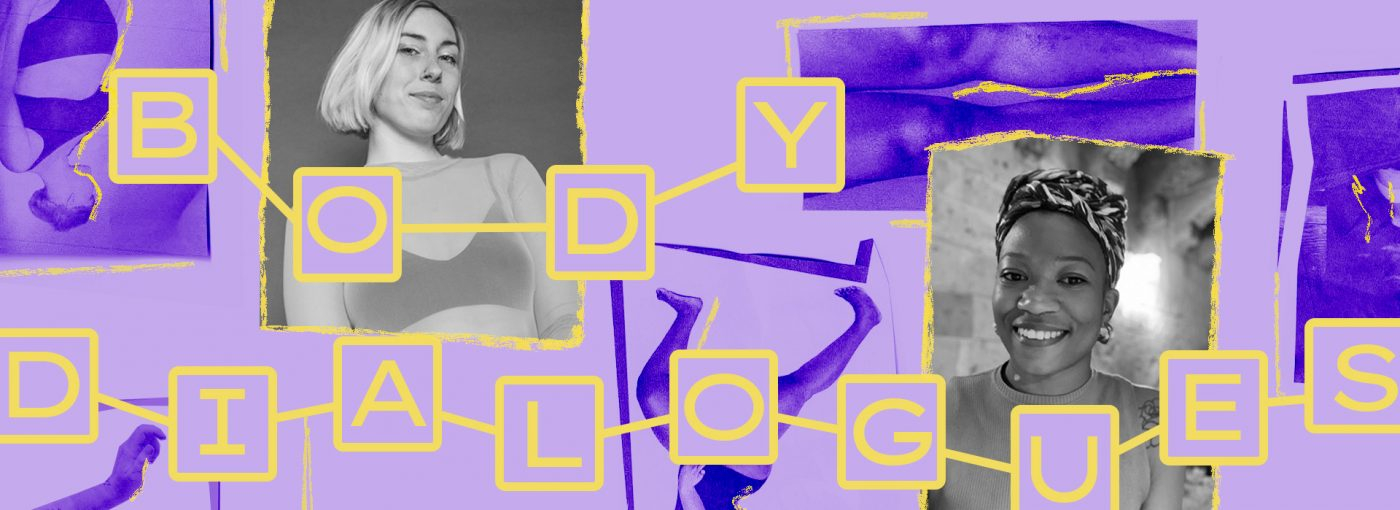In this interview series with Feminist and shado mag, I will be speaking with creatives, educators, activists, writers, and healers to uncover the body’s intelligence. For the last few years, I’ve been embarking on my own journey of mental health and sexual wellbeing, in my personal life and within my work as a Sextech Writer and Sensuality Coach. Along the way, a common thread kept tickling me: it all comes back to the body.
We live within a patriarchal system that seeks to medicalise our bodies and control our methods of reproduction. This has most recently been underlined through the potential overturn of the Roe v Wade ruling in the US and the following abhorrent conversations around reproductive rights.
But this is part of an ongoing fight, in which marginalised communities are most affected. The Reproductive Justice movement was born in 1997 by US-based SisterSong, a women of colour collective created to directly combat this imbalance. Distinct from the Reproductive Rights movement of the 70s and the movements which preceded this, it focused on marginalised people and the fight for more practical access to contraception, comprehensive sex education, pregnancy care, and more.
They demanded “the human right to maintain personal bodily autonomy, have children, not have children, and parent the children we have in safe and sustainable communities.”
15 years on, statistics show Black women in the UK still disproportionately experience maternal mortality, as high as four times more likely than white women. The healthcare system is continuing to fail the most marginalised.
Aside from wider issues of institutionalised racism and sexism in the healthcare system, to me, the failures of the medical world seem partially rooted in a focus on the body as parts to be dealt with, rarely taking into account the whole person, their emotional wellbeing, nor the environmental impact.
To view the body more holistically would not be a new concept, with mind-body dualism dating back to the 17th century. I believe it has plentiful ramifications concerning the way we relate to ourselves and the world we live in – an idea I am excited to explore in these Body Dialogues.
For this interview, I’m curious to learn: could reclaiming our bodily autonomy through holistic sensuality and a community-based approach be the type of reproductive care that is really needed?
The Abortion Companion & community provider
As someone I consider a soul friend – perhaps for our sensual obsession with tea – I knew speaking with Abortion Companion and Pleasure Educator Zachi Brewster would be a wholly nourishing experience.
We first met at a vulva screen-printing workshop held by the sexual-wellness audio app Ferly, and we immediately connected. Our conversations feed my sensual appetite – coinciding with, and expanding beyond, my obsession with sexual pleasure.
Since moving to Italy around the start of the pandemic, our sensual tea dates had mostly moved online. However, we hadn’t properly caught up since her last trip to London where we visited the incredible Paula Rego exhibition at the Tate Britain. So I was keen to talk about where we were both at in our sensuality journey and especially hear all about the launch of her incredible community and body-based project, Dopo: Abortion Support for Her/Him/Them.
Dopo – meaning “after” in Italian – was born out of a desire to support people who wanted to explore abortion, miscarriage, or other pregnancy endings. With an emphasis on inclusivity, Dopo is a community of support providers, and it focuses on three main areas for improving how people feel about abortion:
- Education for young people;
- Training people of all ages to provide support in their communities;
- Actually providing that support.
Zachi is a trained doula, someone who provides support to people through their pregnancy. However, she explains that the term “doula” came out of the white patriarchal feminism of the 60s, and derived from Ancient Greek to mean “female slave for the child-bearing woman.” Understandably, as a Black queer woman, she wants to move away from this and is in the process of changing her title to “Abortion Companion.”
Dopo focuses on supporting people of all genders to have more grounded and embodied abortion experiences – by means of feeling safe and aware in the body. Whether people experienced an abortion last week, or 20 years ago, Dopo aims to provide support at all stages of the process.
Zachi shares the intersectional force behind this community she has created. Her practice of dismantling binaries and acknowledging the multiplicity of oppression excites me. It signals a stark change to me as someone who has studied Queer Theory and Intersectional Feminist Theory, and later realised that putting theory into practice isn’t always actualised in a world where optical allyship is all the rage.
So, how did she do it? First, she brought together abortion and miscarriage under the umbrella of Reproductive Justice.
Zachi explains that society likes to binarise everything, such as dividing people who chose to end their pregnancies and those who didn’t, so we have to separate them.
But life is more complicated than that, she explains. Some people who have a miscarriage may have to have an “induced abortion because their body won’t pass the pregnancy automatically and you may still experience pregnancy symptoms”. Meaning you may have to take abortion pills, “and yet healthcare staff will still call that a miscarriage, not an abortion.”
Abortion is not simply an issue of choice, but a space that needs support in areas of compensation and care, akin to miscarriage. While two seemingly separate experiences, abortion and miscarriage are threaded together by the themes of stigmatisation, grief and disembodiment.
A queer and intersectional lens helps to deconstruct enforced binaries and hierarchies, expanding our perspective to include the question of why people might have abortions and miscarriages; from race, to economic inequality, to policy issues.
Subscribe to shado's weekly newsletter
Exclusive event news, job and creative opportunities, first access to tickets and – just in case you missed them – our picks of the week, from inside shado and out.

It is this journey from disembodiment, into embodiment, toward something transcendent, that Dopo seeks to achieve by guiding people out of disconnection, into reconnection, and then spreading that learned body-wisdom into communities.

Disembodiment: “separated from or existing without the body”
In general abortion care, the focus is on the ending of the pregnancy. Once the pregnancy is over, the care stops and the procedure is seen to be finished. But what about the after?
For Zachi, this is a huge problem: “healthcare just doesn’t see people as whole beings.” While she has full respect for healthcare providers, she explains that “it’s more a matter of addressing those who have felt removed from their bodies or removed from the experience.” Evidently, this separation of mind and body impacts people’s emotional wellbeing, and for many can cause additional and unnecessary stress.
This echoes much of what renowned physician and trauma expert, Gabor Maté, reflects upon in his book When the Body Says No,. It’s not news that the immune system can be deeply impacted by stress, but so often in the medical industry there is a focus on fixing the specific body part while ignoring the mental and emotional factors that contribute to our overall health and healing.
Maté says that researchers were able to predict the presence of cancer in up to 94% of cases judging by psychological factors alone. He also reports that emotional factors and social involvement were found to be “more important” to survival than how far the disease had progressed. What many misunderstand is that this is not a reason to put further honus on the individual for their condition, but to address systemic issues at large, and the way we approach people.
In abortion care, you might be offered a few counselling sessions with a grief counsellor at best, but as many experts are now highlighting, trauma is something that lives in our bodies, and cannot be addressed by therapy alone
Zachi emphasises, “this is especially prevalent in“women’s bodies, and especially Black women’s bodies, non-binary bodies, trans bodies, queer bodies; bodies that are traditionally marginalised, ignored, hypersexualised, used for the benefit of other people, or not seen as intrinsically worthy.”
A study from 2021 took brain scans of Black women in the US who’ve experienced life-long racism, and found “trauma-like” effects, “putting them at higher risk for future health problems.” As is becoming more widely spoken about in medical discourse, it is impossible to disentangle racism and sexism from people’s experience of medical care. When abortion is introduced, it brings with it its own set of stigmas. This can often be a widely stressful and isolating experience – all the more reason for community care to be at the forefront of this discussion.
This feeling of isolation and stress resonated with both of us, and during our conversation, Zachi and I reflected upon some of our personal experiences of disembodiment, dissociation, numbness, anxiety, stress, and depression. Through this, we kept returning to the questions: “How do we stay in our bodies? How do we relate to our bodies?”
Embodiment: “a tangible or visible form of an idea, quality, or feeling”
What is so beautiful about the process of becoming aware of our bodies, is that there is no one-size-fits-all option – and that’s where we can get creative.
One Dopo client told Zachi that they had no recollection of what happened during their abortion because they were put to sleep during the process – the ultimate form of disembodiment. And so Dopo offered them a space to help piece together those missing parts by talking them through the process. The abortion companions are trained to be just that: a companion. Someone to be with the client as they learn and explore, as they ground themselves and take time to remember their experience, or make new memories, and to support them along the way.
To enable people to stay grounded in their bodies, Zachi hopes to make that experience less lonely and to empower people to “feel safer in our bodies, safer in our minds, and safe to feel less like things are happening to us. We need to feel embodied, present and like we have agency in this experience.”
In her own journey, Zachi swears by the following three practices as a process of planting the seeds of embodiment, from which we can nourish and grow out of difficult times.
1. Breathwork
Breathwork is a process which allows us to reconnect and ground ourselves more into our bodies. “It’s very simple, but it takes practice. Especially for people who may be holding complicated emotions or feeling torn, this is a very gentle way of engaging with their bodies. It doesn’t feel confrontational, and doesn’t disembody them further.”
This practice resonated with me. Having done breathing exercises in drama lessons, yoga classes, and meditation practices, I know how powerful the breath can be in its ability to shift your state and offer new insight. One of the most vivid memories I have of working with the breath was in Zachi’s Womb Workshop held by sex-positive community Sonder & Beam in 2018.
In this exercise, we were guided to “breathe a colour” into the body (I saw blue), all the way through our noses, throat, lungs, down into our ‘womb space’ – something that all people can access, no matter what body we have. We were told to watch this colour, notice its texture, observe the colour changing (mine turned pink), breathe it back out, and repeat.
It was a powerful experience, possibly because it brought such acute awareness to a part of my body I typically associated with pain (horrific menstrual cramps) or shame (society’s anti-fat bias), and transformed it into something creative and beautiful. It offered new possibilities.
2. Letter Writing
In the very same Womb Workshop, we were guided to write a ‘Love Letter’ to our womb space. It’s a letter I still have kept away in an envelope in a box in my drawer. I return to it once in a while with feelings of deep fondness and a reminder to reconnect with my body.
Zachi explains that letter writing, “especially when writing by hand, is an uninterrupted stream of thought. It’s a way of expressing. It’s a way for us to see what we are holding, and it can be a way of externalising that which we hold internally.”
Because letters are usually directed to people, whether that’s “to ourselves, our partners, or even to the pregnancy, it’s a direction of energy.” However, as Zachi explains, “it’s up to the individual what to do with that energy in that letter. Some people send it, some don’t, some burn it, bury it, or keep it for themselves.”
Zachi guides Dopo clients to write compassionately; to “do it gracefully, reflect and affirm ourselves through the process as well.” To remove yourself from the whirlwind of emotions that can come up when processing the end of a pregnancy can be a very healing experience.
3. Sensual Exploration
When we feel disembodied or numb, exploring sensuality can be a nourishing tool. “You can use the example of something that is very essential, like a cup of tea,” smiles Zachi knowingly at me. She recommends that next time you have a brew, take a moment to reflect: How does the cup look and feel in my hand? What’s the smell? What are the tastes and textures on my tongue?
Zachi reminds people, especially after a Dopo session with an Abortion Companion, to go and do something that feels good. Something that brings you back to your body, whether it’s having a shower, or eating a chocolate bar. “Do something that keeps you in your body and feels nourishing at the same time.”
Dopo offers a space for people who are both providing care and seeking support, “and many humans fit into both groups,” Zachi says. And because “sensuality is fundamental to our ability to ask for and receive care,” it becomes an important aspect for anyone engaging with the community.
Transcendent: “beyond the range of normal or physical human experience”
Since our conversation, I’ve noticed more and more how often I ignore my body’s simplest needs. They’re so easy to listen to, but I find it so difficult to oblige and fulfil those needs. And I believe that it is paramount we do.
Challenging binary notions of body and mind, and then extending that wisdom to our communities, Dopo is the culmination of bodily self-exploration and the asking of particularly important questions.
“What would I have needed a year ago? What do I still need today? What could other’s going through something similar need?”
Perhaps, these are the questions we could all be asking ourselves. Through breathwork, letter writing, sensual exploration, we can allow the body to share its truth, and in turn build communities of our own making. So I invite you to start planting your own seeds of presence, creativity, and transformation, and see what blossoms.
What can you do?
- Read Pleasure Activism: The Politics of Feeling Good by Adrienne Maree Brown
- Read The Body is Not an Apology by Sonya Renee Taylor
- Follow Zachi Brewster
- Find out more about the work of Gabor Maté
- Find out more about the work of Jessica Parker
- Check out The Queer Sensualist
- Discover Dopo: support groups and resources for anyone receiving or providing abortion
Workshops:
- What’s Somatics Got To Do With It? A workshop with Adrienne Mareee Brown
- Moving Through Loss Workshop with Avni Trivedi
- When The Body Says No: The Cost of Hidden Stress
Studies:
- Psychological identification of breast cancer patients before biopsy, 1982
- Psychosocial risk factors, natural immunity, and cancer progression: Implications for intervention, 1987
- Association of Racial Discrimination With Neural Response to Threat in Black Women in the US Exposed to Trauma, 2021
- Loneliness Predicts Pain, Depression, and Fatigue: Understanding the Role of Immune Dysregulation, 2012
Stay tuned for more musings and conversations with body experts, from writers, creators, and educators.






